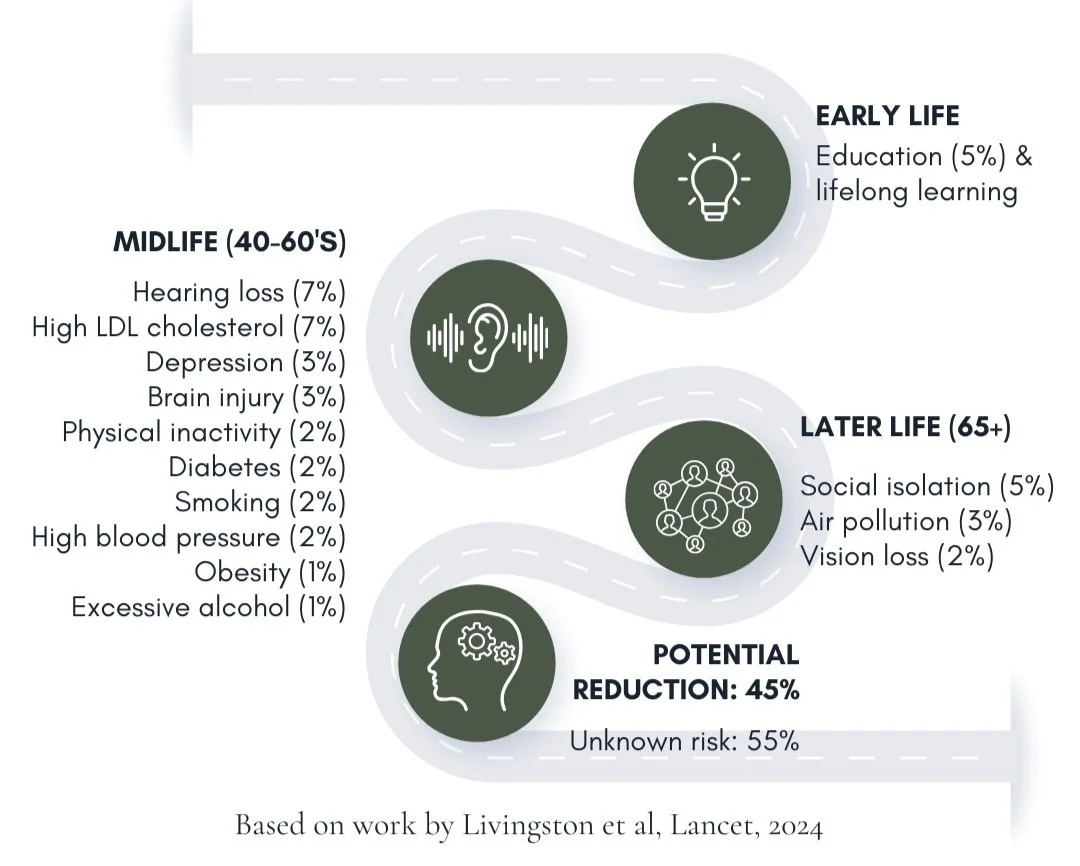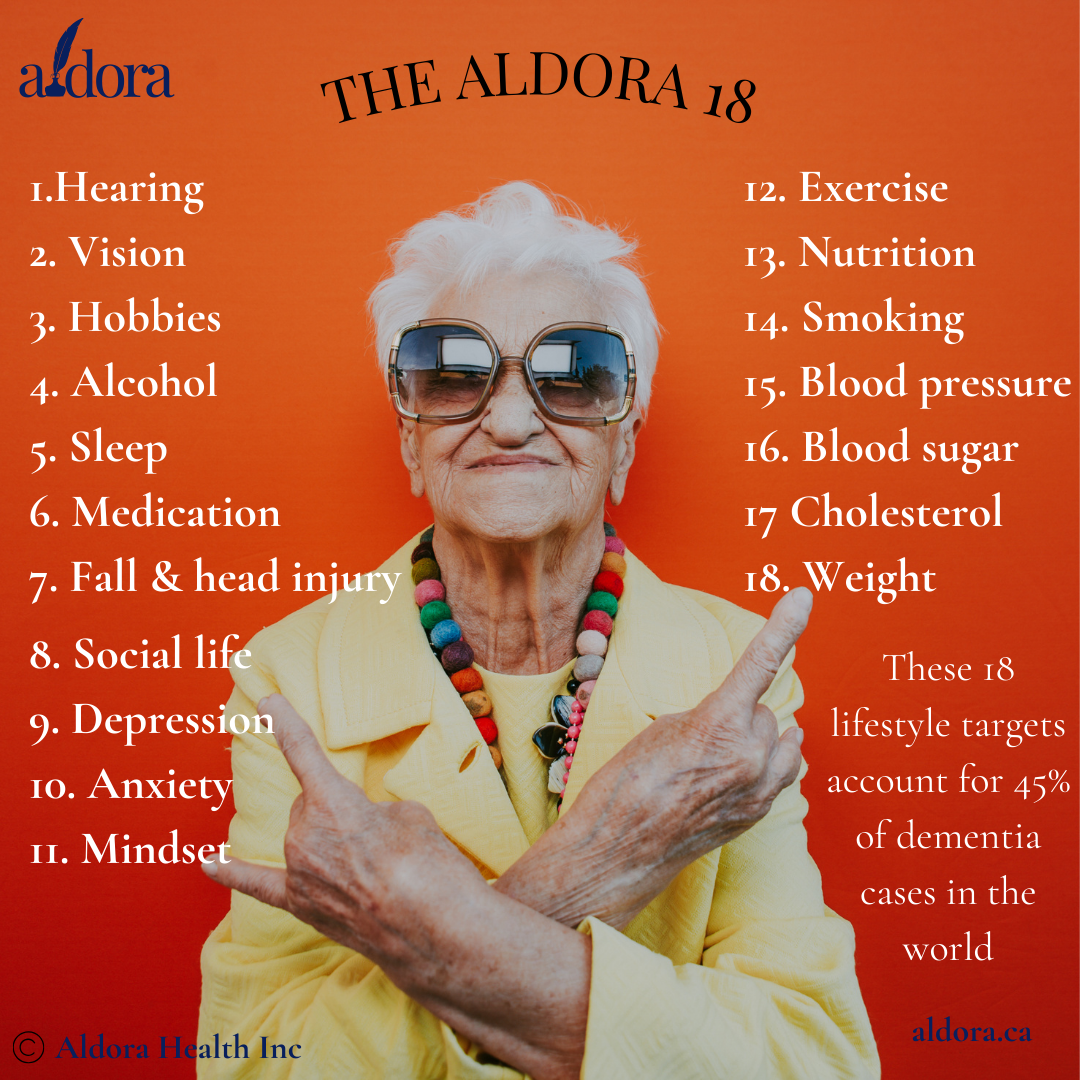The Aldora 18: How to prevent dementia
Jan 2 2024 | Last Updated: June 6 2025
Table of Contents
Worried about developing dementia one day?
You’re not alone, and the good news is there’s more hope now than ever.
In just the last few years, dementia prevention research has taken a leap forward. We now know that at least 45% of dementia cases worldwide are linked to modifiable risk factors and at least 50% in Canada. There are things we can actively do to improve in our wellness and brain health.
Some of these risk factors can increase your chances of developing dementia by more than 200%. But when managed properly, that risk can be dramatically reduced, or even eliminated.
This article introduces you to The Aldora 18: evidence-based strategies for dementia prevention. Each strategy plays a role in protecting your memory and extending your brain’s resilience well into later life.
Optimizing these areas can give you the best possible chance at a long, independent life - one with clarity, connection, and purpose.
Let’s get started.
Keep reading… secrets to health are close by!
The research on prevention
As of 2024, researchers have found that 45% of dementia cases in the world could be prevented by tackling 14 risk factors (read the research here).
In Canada, at least 50% of cases are preventable (read the research here).
These risk factors are spread out across our lifetimes, but mostly cluster around midlife, or the ages of 40-60.
This means that these decades are the best time to start investing in your brain’s future.
14 ways to prevent 45% of dementia cases in the world.
Based on the latest research there are five other emerging targets that could increase your risk for dementia including:
inadequate sleep
lack of nutrition
anticholinergic medications
stress/anxiety
lack of purpose
The Aldora 18 are made up of all the risk factors that we have some control over - which includes everything except air pollution.
By fixing these modifiable risk factors, we can prevent dementia in at least 45-50% of cases!
How is prevention possible?
Prevention is possible because your brain is like a set of scales - as long as it stays balanced, it stays healthy.
If your brain is strong enough you can overcome dementia symptoms for many years, and possibly your entire life.
Imagine that we all have a set of scales in our brains. One side is for strength and the other side is for damage.
Damage comes from the build-up of toxic proteins like beta-amyloid and poor blood flow, which themselves come from other causes like alcohol, falls, high blood pressure, certain medications, etc.
Strength comes from keeping the brain active through our hearing, vision, hobbies, social life, and sense of purpose, and from having enough sleep, exercise, and nutrition.
Brain health is a dynamic equilibrium, and symptoms of dementia start to appear only when the amount of damage outweighs the amount of brain strength. This is the medical concept of ‘cognitive reserve’ or ‘homeostasis’ which we explore more in this article.
People often erroneously think dementia is solely determined by our genes and family history. In reality, only about 10% of dementia cases come from genetic risks like the ApoE4 allele (for late-onset dementia) and certain inherited early-onset dementias like APP, PSEN1, or PSEN2.
Strength and damage are largely dictated by lifestyle factors, which is why targeting these factors can help you prevent clinical symptoms of disease.
Overall: The Aldora 18
Overall, these are the 18 things you can do to prevent dementia in at least 45-50% of cases.
The 18 actions you can take to prevent dementia include:
Hearing: protect your ears from loud noises and wear hearing aids if you need them
Vision: protect your eyes from sun damage and get cataracts fixed
Hobbies: pursue more education, life-long learning, and push yourself to try new things
Alcohol: avoid excessive alcohol intake (less than 7 drinks a week and ideally less than 2)
Sleep: get 7-8 hours of sleep a night & treat sleep apnea
Medications: stop certain medications that cause memory problems
Fall Prevention: prevent falls that cause head injury
Social Life: build a strong friend group & social life
Depression: treat depression with lifestyle changes and/or medication
Anxiety: treat anxiety with lifestyle changes and/or medication
Mindset: build a sense of meaning and purpose in your life
Exercise: get a mix of aerobic, strength, and balance exercises every week
Nutrition: follow a Mediterranean diet and make sure you are getting enough B12, Vitamin D, and Thiamine
Smoking: stop smoking
Blood Pressure: keep your top number around 110-130 with lifestyle changes and/or medications
Blood Sugar (Diabetes): keep your average blood sugar (HbA1C) between 6% - 7.5% with lifestyle changes and/or medications
Cholesterol: keep your LDL around 2 - 3mmol/L with lifestyle changes and/or medications
Weight: keep your weight in the recommended range
Will this guarantee I won’t get dementia?
No, but it will give you a pretty good chance.
We know that the less risk factors you have, the less likely you are to get dementia. People who live into their 90’s and even 100’s without dementia tend to have very few of the risks listed above.
Based on clinical expertise and emerging research, it seems that when you have 3 or fewer risk factors you are much less likely to show signs of dementia. When you start having 4, 5, or 6+ risk factors, it becomes much more likely that you will exhibit memory loss, especially as you age.
As well, if any of these risk factors are very uncontrolled - such as heavy alcohol use, really high blood pressure or blood sugar, total lack of sleep, etc - then you’re more likely to show signs of dementia at a younger age.
This is good news - you can have a huge impact on your chances of dementia by keeping your number of risk factors low. You don’t have to be perfect, but you do need to stay balanced - leaving just the small risk that comes from your genes.
If you have the APOE4 allele, you may want to keep your risk factors close to zero as possible (you can read more about genetics here)
Next Steps
You now know WHAT you need to do. The next step is to learn HOW.
How do you get better hearing? How do you build your social life? What do you do manage your blood pressure?
If you have someone that’s an expert in one of these areas, lean on them for advice and suggestions.
Or, become a member to get access to all the above and more.
Related Posts
Key References
Livingston G et al. Dementia prevention, intervention, and care: 2024 report of the Lancet standing Commission. The Lancet, 2024; 404:572 - 628.
Sabia S, Fayosse A, Dumurgier J, et al. Association of sleep duration in middle and old age with incidence of dementia. Nat Commun, 2021; 12: 2289.
Chen H, Dhana K, Huang YH, et al. Association of the Mediterranean dietary approaches to stop hypertension intervention for neurodegenerative delay (MIND) diet with the risk of dementia. JAMA Psychiatry 2023; 80: 630–38.
Stott J, Saunders R, Desai R, et al. Associations between psychological intervention for anxiety disorders and risk of dementia: a prospective cohort study using national health-care records data in England. Lancet Healthy Longev 2023; 4: e12–22.
Son S, Speechley M, Kivipelto M, et al. Potentially Modifiable Dementia Risk Factors in Canada: An Analysis of Canadian Longitudinal Study on Aging with a Multi-Country Comparison. J Prev Alz Dis 2024; 5(11):1490-1499
Disclaimer: The content on Aldora Health is for educational and informational purposes only and is not intended to substitute for professional medical advice, diagnosis, or treatment. Always seek the advice of your physician or other qualified health provider with any questions you may have regarding a medical condition. For more read our Terms of Use.








